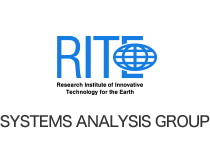Project for international cooperation on the analysis and assessment of technologies for climate change mitigation (ALPS IV; FY2022-)
ALPS Project(ALternative Pathways toward Sustainable development and climate stabilization)
Conclusion
Although the Paris Agreement was formulated as a mechanism for all countries around the world to work on emission reductions, there are currently large differences in the marginal CO2 abatement costs for countries across the world to achieve their goals. This could induce transfers of industries, especially those with high CO2 emission intensity, between countries and significantly reducing the effectiveness of global emission reductions. Europe is aiming to introduce a carbon border adjustment tax to reduce this risk, but the analysis in this project suggests that the effect of this tax will be limited, although it will have a certain effect. It is true that there has been a rapid increase in international efforts to strengthen climate actions, and there has been significant progress, especially in strengthening economic response through the financial sector. At the same time, we need to keep a close eye on how COVID-19 pandemic, the sharp rise in fossil fuel prices, and the risk of international conflicts will affect the climate actions. Soaring fossil fuel prices have been making fossil fuel producing companies more profitable. This could also change the trend of de-fossil fuel financing over the past few years. In any case, without technological and social innovation, there will be no significant reduction in global emissions and no carbon neutralization. It is thus vital to create a socioeconomic environment ripe for extensive innovation.
As an ambitious target does not necessarily guarantee a continuous fight over climate change on the long-term, the compatibility of climate change mitigation and economic growth is indispensable for a truly effective climate change mitigation. Clear guidance and concrete measures, rather than wishful thinking, are needed to deliver steady progress toward "green growth" or a "virtuous cycle between the environment and the economy". Moreover, while there are numerous uncertainties, there is a great need for a strategy that will handle risks in a comprehensive manner. Although we need further insights and deeper analysis, we believe this study offers a relevant framework to pursue "true green growth" and concrete measures, also providing quantitative analysis and evaluation for that.

